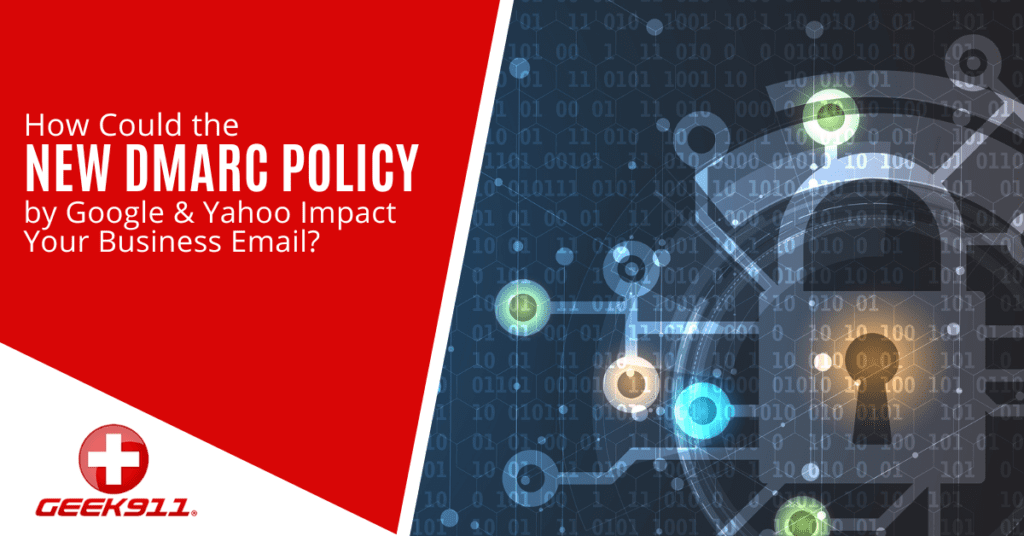How Could the New DMARC Policy by Google & Yahoo Impact Your Business Email?

In the ever-evolving landscape of cybersecurity, email remains one of the most vulnerable channels for cyber threats. Phishing attacks, spoofing, and email scams continue to plague businesses, leading to data breaches, financial losses, and damage to brand reputation.
To combat these threats, email authentication protocols like DMARC (Domain-based Message Authentication, Reporting, and Conformance) have been developed and implemented by major email service providers. Recently, Google and Yahoo announced updates to their DMARC policies, prompting businesses to reevaluate their email security strategies. In this article, we’ll delve into the significance of these changes and how they could potentially impact your business email communications.
Understanding DMARC
Before delving into the implications of Google and Yahoo’s new DMARC policies, let’s first understand what DMARC is and how it functions. DMARC is an email authentication protocol that allows email senders to specify policies for email authentication, providing recipients with clear instructions on how to handle emails that fail authentication checks. It works alongside two other authentication protocols, SPF (Sender Policy Framework) and DKIM (DomainKeys Identified Mail), to verify the authenticity of an email sender.
SPF
Sender Policy Framework (SPF) helps to prevent email spoofing by verifying that the sender’s IP address is authorized to send emails on behalf of a specific domain. SPF records are published in the Domain Name System (DNS) and specify which IP addresses are allowed to send emails for a particular domain.
DKIM
DomainKeys Identified Mail (DKIM) adds a digital signature to outgoing emails, allowing the recipient’s email server to verify that the email was sent by an authorized sender and that its content has not been tampered with in transit.
DMARC
DMARC builds upon SPF and DKIM by providing a policy framework for email authentication. It allows senders to specify what action should be taken when an email fails authentication checks, such as quarantining or rejecting the email.
The Changes by Google and Yahoo
Google and Yahoo recently announced updates to their DMARC policies, which could have significant implications for businesses that rely on email communications. Google announced that it would enforce a stricter DMARC policy, moving from “p=none” to “p=reject” for Gmail accounts. Similarly, Yahoo also tightened its DMARC policy, moving to “p=reject” for Yahoo Mail.
Implications for Businesses
These changes mean that emails sent from domains using Google or Yahoo addresses that fail DMARC authentication checks will be automatically rejected or placed in the spam folder. This could have several implications for businesses, including:
- Increased Email Deliverability Issues: Businesses that send emails from domains using Google or Yahoo addresses may experience increased deliverability issues if their emails fail DMARC authentication checks. This could result in legitimate emails being marked as spam or rejected altogether.
- Impact on Brand Reputation: Rejection or placement in the spam folder can have a detrimental impact on a business’s brand reputation. Customers may lose trust in a company if they perceive its emails as spam or fraudulent.
- Potential Loss of Business Opportunities: If important business communications are not reaching their intended recipients due to DMARC enforcement, it could lead to missed opportunities and potential loss of revenue.
Steps to Ensure Compliance
To ensure compliance with the new DMARC policies enforced by Google and Yahoo, businesses should take proactive steps to enhance their email authentication practices. Here are some recommended actions:
Implement DMARC
If not already in place, businesses should implement DMARC for their domains and specify a policy for handling emails that fail authentication checks. This will help ensure that only legitimate emails are delivered to recipients’ inboxes.
Monitor DMARC Reports
Regularly monitor DMARC reports to identify any issues with email authentication and take corrective actions as necessary. DMARC reports provide valuable insights into how emails from your domain are being handled by recipients’ email servers.
Use Dedicated IP Addresses
Consider using dedicated IP addresses for sending business emails, especially if you frequently send high volumes of emails. This can help improve deliverability and minimize the risk of being flagged as spam.
Educate Employees
Educate employees about the importance of email security and best practices for avoiding phishing scams and other email threats. Employee awareness and training are essential components of any effective email security strategy.
Understand the Changes
The new DMARC policies enforced by Google and Yahoo have significant implications for businesses that rely on email communications. By understanding these changes and taking proactive steps to enhance email authentication practices, businesses can minimize the risk of email deliverability issues and protect their brand reputation.
At GEEK911, we specialize in providing comprehensive cybersecurity solutions, including email security services. Contact us today to learn how we can help safeguard your business against email threats and ensure compliance with the latest industry standards.
